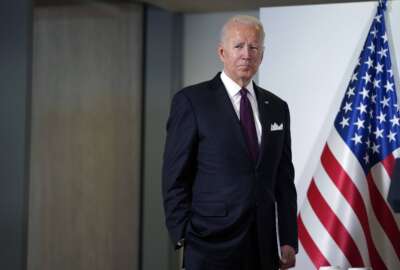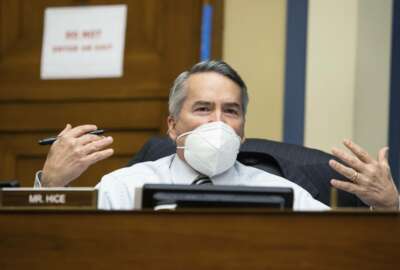With deadlines inching closer, employees and contractors get more details on federal vaccine mandate
The Biden administration in recent days has offered up more details on how agencies might handle religious exception requests from federal employees. Contractors...
Federal agencies should provide administrative leave for their employees to receive a COVID-19 booster vaccine, the Biden administration said in a series of recent policy updates.
“The administrative leave will cover the time it takes to travel to the vaccination site, receive the vaccination dose and return to work,” the Safer Federal Workforce Task Force said Friday in newly updated frequently asked questions. “Because there is currently no requirement for federal employees to receive a vaccine booster shot or additional dose, granting duty time is not allowable in these instances.”
Agencies can apply this policy retroactively to the time the booster shots became available. A federal employee, for example, who already received a Pfizer booster shot on or after Sept. 22, could receive up to four hours of paid administrative leave retroactively.
Friday’s determination on providing administrative leave for booster shots was one of several updates from the Safer Federal Workforce Task Force, the group led by the White House COVID-19 response coordinator, Office of Personnel Management and General Services Administration.
Notably, the task force also updated its sample template that agencies might use for their employees to request a religious exception to the federal vaccine mandate.
The sample form again suggests employees would have to describe the nature of their objection to the federal vaccine mandate and explain why complying with it would conflict with their religious beliefs. It again asks whether employees have a religious objection to all vaccines or just the COVID-19 vaccine — and whether they’ve received any other inoculations as an adult before.
But the new version clarifies employees don’t need to answer every question in order to be considered for a religious accommodation, though it recommends they provide as much information as possible.
It reiterates employee objections to the federal vaccine mandate that are “based on non-religious reasons, including personal preferences or non-religious concerns about the vaccine” don’t qualify them for an exception.
The sample form also states: “Agencies may consider several factors in assessing whether a request for an exception is based on a sincerely held religious belief, including whether the employee has acted in a manner inconsistent with their professed belief. But no one factor is determinative. An individual’s beliefs — or degree of adherence — may change over time and, therefore, an employee’s newly adopted or inconsistently observed practices may nevertheless be based on a sincerely held religious belief. All requests for a religious exception will be evaluated on an individual basis.”
In an updated memo to the civilian workforce, the Defense Department said its employees would need to provide similar information to request a religious exception.
The department is working to ensure DoD managers are handling similar accommodation decisions in a consistent manner, Gil Cisneros, undersecretary of defense for personnel and readiness, said in the Oct. 29 memo.
“Because all DoD civilian employees must now be vaccinated against COVID-19 as a condition of employment, exemptions will be granted in limited circumstances and only where legally required,” the memo reads.
DoD civilian employees should file their exception requests by Nov. 8, Cisneros said. Other agencies have set other deadlines.
Failure to submit an accommodation request by that date won’t immediately deny an employee an exception, but DoD said an untimely submission “may be relevant in evaluating the request.”
The Biden administration has said agencies should not begin the disciplinary process for employees who have a pending medical or religious exception to the vaccine mandate, a policy that DoD reiterated as well.
Federal employees who have accommodation requests pending must follow their safety protocols while the exception process is ongoing, both the task force and DoD have said.
Federal contractors should decide how to discipline employees
The task force on Monday also offered up a few more details on how agencies should enforce the federal vaccine mandate for contractors.
Generally, contractors should show they have a policy that requires vaccines for their workforces — and that they’ve communicated those requirements to their employees, an industry source who attended a White House briefing on the new guidance, said.
“Where covered contractors are working in good faith and encounter challenges with compliance with COVID-19 workplace safety protocols, the agency contracting officer should work with them to address these challenges,” the task force said in a series of frequently asked questions updated Monday. “If a covered contractor is not taking steps to comply, significant actions, such as termination of the contract, should be taken.”
The Biden administration has said that it’s up to each individual contractor to decide how will it handle employee requests for a medical or religious accommodation to the federal vaccine mandate from its employees.
Contractors don’t need to resolve all requests for accommodation from their employees before starting work on a covered contract or at a covered workplace, the Biden administration said Monday.
Contractor employees with pending accommodations should follow COVID safety protocols, such as wearing a mask and social distancing, while their employer resolves their requests.
Those who do receive an accommodation will continue to follow those protocols, though the administration said there may be instances where, due to the nature of the employee’s job, tougher safety requirements are required.
In addition, an agency or contractor could decide that, due to the particular nature of an employee’s job, no safety protocol other than vaccination is sufficient.
“In that case, an onsite contractor employee who is not fully vaccinated would be unable to perform the requisite work at the federal workplace,” the task force said. “Such circumstances do not relieve the contractor from meeting all contractual requirements.”
The task force said contractors should tell their customer agencies about the employees who have received an accommodation and work onsite at a federal facility.
If employee accommodation requests are denied, it’s up to each contractor to set a timeline for their workers to become fully vaccinated, the task force said.
It’s also up to each contractor to decide how they’ll discipline individual employees who refuse to comply with the federal vaccine mandate.
Contractors might consider applying the “usual processes” for enforcing workplace policies on their employees who refuse to comply with this particular vaccine mandate, the task force said.
They might also consider using the three-step process OPM has recommended for federal employees who fail to comply. That process starts with educating and counseling noncompliant employees, proceeds to a brief, unpaid suspension and ends with removal.
“An agency may determine that a covered contractor employee who refuses to be vaccinated in accordance with a contractual requirement pursuant to [the executive order] will be denied entry to a federal workplace, consistent with the agency’s workplace safety protocols,” the task force said.
Covered federal contractors face a Dec. 8 deadline to comply with the administration’s federal vaccine mandate.
But some industry members say that timeline is too aggressive, given the number of outstanding questions and challenges associated with the federal vaccine mandate — and its broad scope within the contracting community.
The Professional Services Council, which represents nearly 400 companies that do business with the federal government, said some of its members have pushed for more time to comply with the vaccine mandate.
“These members range in position. Some are very pro-vaccine mandate; they’ve already instituted them within their own companies. Others are really concerned about the timeline and the specificity about who needs to be vaccinated,” Stephanie Kostro, PSC’s executive vice president for policy, told the Federal Drive with Tom Temin. “As a trade association we do represent the broad swath of our companies. As an organization, PSC appreciates what the government is trying to do in terms of a vaccine mandate, but it has to be part of a broader approach to stopping the spread of COVID, and that includes testing, treatment options, exemptions for medical disability and for religious reasons and reasonable accommodations.”
Nearly 20 states have sued the administration over the federal vaccine mandate for contractors, citing various procurement law and Administrative Procedure Act concerns.
Copyright © 2025 Federal News Network. All rights reserved. This website is not intended for users located within the European Economic Area.
Nicole Ogrysko is a reporter for Federal News Network focusing on the federal workforce and federal pay and benefits.
Follow @nogryskoWFED







